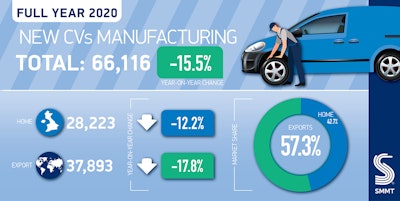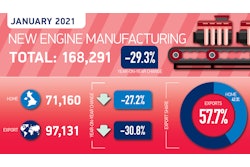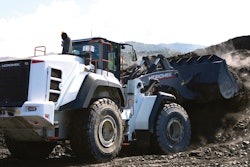
Data recently released by the Society of Motor Manufacturers and Traders (SMMT) shows UK commercial vehicle manufacturing declined 15.5% in 2020. A total of 66,116 vans, trucks, taxis, buses and coaches were manufactured during the year.
Engine production was also down in 2020, with just over 1.8 million units produced.
SMMT says the coronavirus pandemic played a large factor in manufacturing output for these markets, as it has in many others around the world. Lockdowns, social distancing measures and market uncertainty made it difficult to manufacture products and determine customer demand.
2020 a tough year for engine manufacturing
December engine production fell 7.9%, leading to a total decline of 27% in 2020. SMMT says production for domestic and overseas markets fell 23.4 and 29.1% respectively.
Mike Hawes, SMMT Chief Executive, said in the organization's press release announcing the yearly figures, "2020 was a tough year for UK engine manufacturers with the coronavirus pandemic chiefly responsible for the fall in output. That said, factories still turned out more than 1.8 million internal combustion engines, with the majority of these exported globally.
"This reinforces how important it is that, in the increasingly rapid transition to electrification, the UK’s skilled engine manufacturing workforce is not left behind, as they should be a critical component in positioning the country as a competitive place to produce ultra-low and zero emission vehicles."
 Society of Motor Manufacturers and Traders (SMMT)
Society of Motor Manufacturers and Traders (SMMT)
Annual output for commercial vehicles lowest in decades
In December 2020, commercial vehicle production declined 9.2%, capping off a weak quarter and year in general, says SMMT. Production output for the year was the lowest annual output since 1933, the organization says.
Output for overseas markets declined 17.8% while vehicle production for the domestic market was down 12.2%. According to SMMT, over half (57.3%) of all UK-built commercial vehicles is destined for global markets, which emphasizes the importance of having good trade relations with other countries.
The EU is the main market to which many of these vehicles are exported. As such, the lengthy progression to a Brexit trade deal was also a factor which negatively impacted the sector during the year. While a deal has now been reached, there are still many factors that need to be sorted out and could further impact the industry in early 2021.
"2020 challenged commercial vehicle manufacturers beyond belief and, as the final figures show, reflect what has been the worst year in a lifetime for the sector. The pandemic hit markets across Europe while prolonged uncertainty threatened business confidence at home, as a potential ‘no deal’ Brexit loomed over the industry for much of the year and was only put to rest on Christmas Eve. However, with the vaccine rollout now in full swing and the necessary clarity businesses need for cross-channel trading requirements now visible, there is hope for the future," said Hawes in SMMT's press release announcing the yearly figures.
"2021 must be focused on recovery and growth for commercial vehicle manufacturing. This starts with providing the right conditions to both attract investment and accelerate the take up of alternatively fueled vehicles – a crucial next step on the way to a rapid and successful sector transition in the UK."
 Society of Motor Manufacturers and Traders (SMMT)
Society of Motor Manufacturers and Traders (SMMT)



















